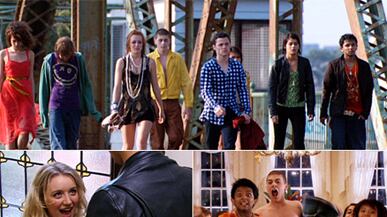Despite the hype, MTV’s scripted teenage drama Skins does not break child-pornography laws—but it still has plenty to be ashamed of, says Jace Lacob.
MTV’s adaptation of hit British teen drama Skins made headlines this week amid talk that the show, overseen by Brian Elsley (who co-created the original with son Jamie Brittain), could potentially cross the line into breaking federal child-pornography statutes.
In a recent New York Times piece, reporter Brian Stelter indicated that the cable channel’s executives had become “concerned” that scenes from Skins, which revolves around a group of hard-partying and sexually voracious teenagers—were in violation of federal law concerning sexual acts featuring minors.
ADVERTISEMENT

The scene in question that was causing all of the alleged hand-wringing at MTV? In a rough cut of the third episode, slated to air January 31, “a naked 17-year-old actor is shown from behind as he runs down a street.” But those raising the objections—including an always-happy-to-be- incensed Parents Television Council and advertiser Taco Bell, which pulled its commercial support—fail to take into account the context in which the rear nudity occurs.
There is nothing remotely lascivious about the scene in which Chris ( Jesse Carere) is thrown out of his house by a drug-addled squatter after his mother has walked out on him. Naked and humiliated, Chris walks down the street with no clothes on and nowhere to go. It’s a depressing scene that’s not played for laughs or for titillation.
Which is where the question of child pornography should be erased altogether. The U.S. Department of Justice defines child pornography as “the visual depiction of a person under the age of 18 engaged in sexually explicit conduct.” For one, the actor in question, while under the age of legal consent, was not engaged in sexually explicit behavior, nor in any sexual situation in that instance. Second, the DOJ states “the legal definition of sexually explicit conduct does not require that an image depict a child engaging in sexual activity,” and that “a picture of a naked child may constitute illegal child pornography if it is sufficiently sexually suggestive.”
It’s one thing to be sensitive to the concern of whether child-pornography laws were being violated, but it’s quite another to use fears of child porn in order to further leverage a show.
Let’s be upfront about this. There is nothing remotely sexually suggestive about the scene that allegedly raised eyebrows at MTV, a network notorious for pushing the envelope in terms of sexuality and smutty behavior, airing such shows as The Real World, Jersey Shore, The Hard Times of RJ Berger, and Undressed. (In those cases, the actors in question were over the age of consent, perhaps rendering the content discussion moot.)
In fact, there's nothing remotely in that sequence that could constitute a breach of the federal child pornography statute. Even the simulated acts of sexual intercourse, masturbation, etc. that occur within Skins—which are more troubling than the context of the bare buttocks here—still don't constitute a violation, as there’s nothing explicit about them nor do they feature nude genitalia or breasts, or any content that could be perceived as crossing the line into what’s legally defined as pornography.
Scenes, such as when Stanley ( Daniel Flaherty) or Tea ( Sofia Black D’Elia) masturbate (the latter to the iconic poster of Audrey Hepburn in Breakfast at Tiffany’s) or any of the instances of simulated sexual intercourse, are careful not to depict any nudity, restricting the footage to a bared back or similar. (BBC America, which aired three seasons of the U.K. Skins, pixilated all insistences of frontal or breast nudity, as well as daytime broadcasts of any backside nudity, which is permitted in the 10 p.m. hour, according to a network spokesperson.)
So why were these objections raised now, and not during Skins’ development or production process? Its Monday premiere netted 3.3 million viewers—it’s a strong start for a scripted show on MTV, but was surely bolstered by the special episode of the phenomenally popular Jersey Shore MTV had slotted before it.
The more cynical among us might wonder whether the story in The New York Times was intended by MTV to generate controversy and bring more viewers to the series in the first place by playing up the more salacious aspects of the show. Which, if true, is extremely troubling, if not vile. It’s one thing to be sensitive to the concern of whether child-pornography laws were being violated, but it’s quite another to use fears of child porn in order to further leverage a show.
MTV, meanwhile, released a statement Wednesday about the tempest in a teapot swirling around Skins.
" Skins is a show that addresses real-world issues confronting teens in a frank way,” wrote an MTV spokesperson. “We review all of our shows and work with all of our producers on an ongoing basis to ensure our shows comply with laws and community standards. We are confident that the episodes of Skins will not only comply with all applicable legal requirements, but also with our responsibilities to our viewers. We also have taken numerous steps to alert viewers to the strong subject matter so that they can choose for themselves whether it is appropriate."
If only such care was being taken with whether the show is good. Because where E4’s Skins soared, MTV’s Skins crashes.
Unlike the original, which was groundbreaking in its honest depiction of millennial teenage life, MTV’s version seems calculatedly obsessed with the filth factor, pushing that content front and center while failing to realize that the original was so successful because it mined the rich interior lives of the lads and lasses of Bristol for narrative effect.
At once grounded and existing in a Technicolor heightened reality, the U.K. Skins captured the melancholia and often death-defying joy of adolescence. The show tackled such topics as teenage sexuality, rape, suicide, drug abuse, eating disorders, mental illness, and death with a combination of sensitivity and shamelessness.
Here, however, there’s a washed-out quality to everything, a leaden dullness to the plotting (which, ironically, leans way too heavily on the source material, at times beat by beat), and a largely wooden quality to the young actors. The U.S.’ Tony ( James Milo Newman) lacks the serial killer charisma of the original’s Tony Stonem ( Nicholas Hoult), who held both his best friend and his girlfriend in his thrall, playing with both like a child would dolls. Likewise, the loveably spacey Cassie ( Hannah Murray) is transformed here into Cadie ( Britne Oldford), an unexpressive mental patient who has a penchant for knives and cheese puffs, while silent Eura ( Eleanor Zichy) lacks the instincts and presence of her scene-stealing predecessor Effy ( Kaya Scodelario).
Even more frustrating is that the vibrant patois that Elsley and his famously young writing staff so expertly captured on the original feels empty here, the words pouring from the mouths of the Baltimore (actually and obviously Toronto) kids falling entirely flat. The result is something that seems a bland mix of Fox’s melodramatic Glee and MTV’s own Undressed (which ran from 1999 to 2002), containing none of the magic of the British original. Moments of attempted profundity, so easily achieved in the U.K.’s version, seem manufactured here.
While MTV’s Skins does not break any indecency laws, by making the conversation about the breaking of broadcast (as well as moral and legal) taboos, it does shift attention from the appalling lack of quality here. But the fact remains that, illegal or no, this cheap-looking remake doesn’t do the audience any favors.
Jace Lacob is The Daily Beast's TV Columnist. As a freelance writer, he has written for the Los Angeles Times, TV Week, and others. Jace is the founder of television criticism and analysis website Televisionary and can be found on Twitter. He is a member of the Television Critics Association.





